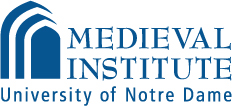 The 89th Annual Meeting of the Medieval Academy was held at UCLA from 10-12 April and was, by all accounts, a great success. More than 375 attendees heard 158 papers and three plenaries, enjoyed wine and hors d’oeuvres on the Grand Horizon Terrace, and basked in the sunshine of southern California. Special events included a tour of the Getty Center, a master class on Byzantine art, an exhibit of medieval and Renaissance manuscripts curated by Richard Rouse, and a splendid closing reception at the Getty Villa in Malibu where attendees were treated to a private viewing of the major exhibition “Heaven and Earth: Art of Byzantium from Greek Collections“. Our thanks to the UCLA Center for Medieval & Renaissance Studies and to the Getty Center for organizing and implementing such a successful gathering.
The 89th Annual Meeting of the Medieval Academy was held at UCLA from 10-12 April and was, by all accounts, a great success. More than 375 attendees heard 158 papers and three plenaries, enjoyed wine and hors d’oeuvres on the Grand Horizon Terrace, and basked in the sunshine of southern California. Special events included a tour of the Getty Center, a master class on Byzantine art, an exhibit of medieval and Renaissance manuscripts curated by Richard Rouse, and a splendid closing reception at the Getty Villa in Malibu where attendees were treated to a private viewing of the major exhibition “Heaven and Earth: Art of Byzantium from Greek Collections“. Our thanks to the UCLA Center for Medieval & Renaissance Studies and to the Getty Center for organizing and implementing such a successful gathering.
The following awards were presented at the Business Meeting:
Van Courtlandt Elliott Prize: Paul Milliman, “Ludus Scaccarii: Games and Governance in Twelfth-Century England” in Chess in the Middle Ages and Early Modern Age, ed. Daniel O’Sullivan (De Gruyter, 2012)
John Nicholas Brown Prize: Elina Gertsman, The Dance of Death in the Middle Ages (Brepols, 2010)
The Haskins Medal: Ronald Witt, The Two Latin Cultures (Cambridge Univ. Press, 2012)
Robert L. Kindrick-CARA Award for Outstanding Service to Medieval Studies: Jerry Singerman (Univ. of Pennsylvania Press)
CARA Awards for Excellence in Teaching: Phillip Adamo (Augsburg Coll.) and Charles Wright (Univ. of Illinois, Urbana-Champaign)
Best Graduate Student Paper: Andrew Richmond (Ohio State University), “‘The broken schippus he ther fonde’: Beaches, Wrecks, and the Human Costs of Investment in Middle English Romance”
Graduate Student Travel Bursaries were awarded to:
Alice Isabella Sullivan (University of Michigan), “Monastic Architecture in Moldavia as a Site of Encounter Between Byzantium and the West”
Francesca Tuoni (University of New Mexico), “Arabisms and Hospitallers”
Erika Joy Johnson Tritle (University of Chicago Divinity School), “Baptismal Theology and Civil Nobility: A Shotgun Wedding in Fifteen-Century Castile?”
Esther Liberman Cuenca (Fordham University), “The Medium and the Message: Borough Custumals in Context”
Justin L. Barker (Purdue University), “Multiple Encounters of Gender and Religious Identity in Bevis of Hampton”
Eileen Kim (University of Toronto), “Charitable Bequests and the Cultivation of a Spiritual Economy in the London Commissary Court Wills, 1350-1485”




